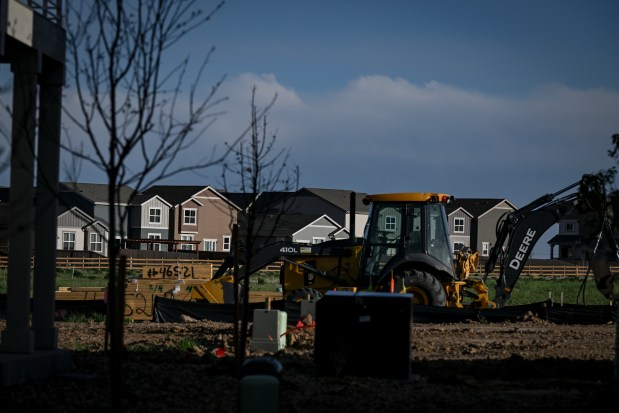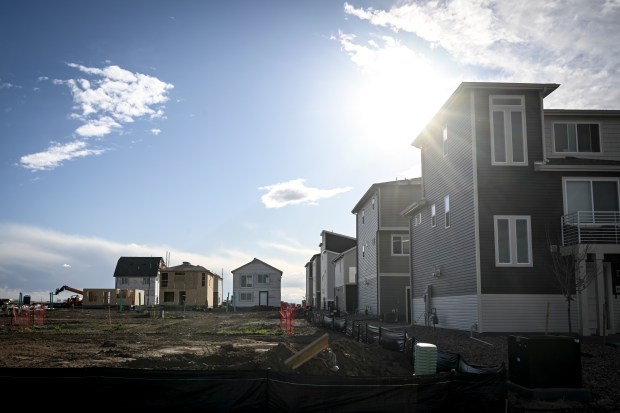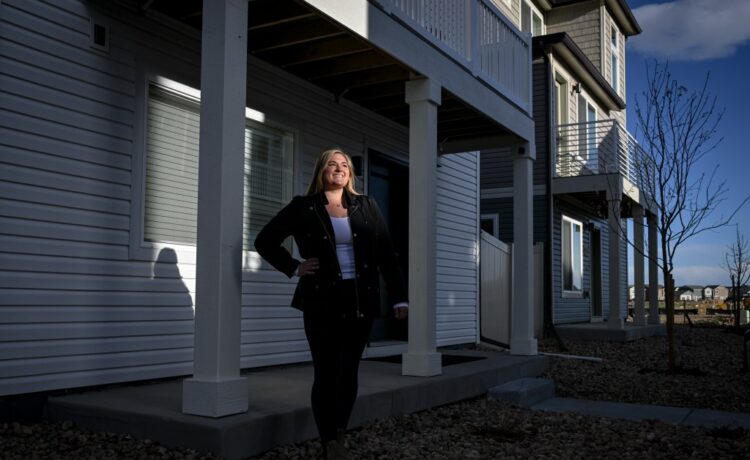Kelly Morgan, 27, grew up in Arizona and took a key piece of advice from her parents with her when she moved to Colorado. They had bought a home in their mid-20s and drilled it into her that she needed to buy a place of her own as soon as she could.
“I didn’t think that buying a home was attainable at my age, but I met with a lender and got qualified,” Morgan said. But qualified and realized aren’t the same thing. Denver didn’t have much available in her $300,000 to $400,000 price range. What she did find was either in poor condition or came with high homeowners’ association fees that sapped her buying power.
Condos have long been a stepping stone from renting into ownership, but many of the places she considered carried association fees of $600 to $700 a month beyond the mortgage payment. Most condo developments were older, and Morgan, who works in the construction business, understood the costs associated with deferred maintenance.
She ended up buying a new two-story, two-bedroom home with a two-car garage and 1,100 square feet of space from Oakwood Homes. The base price was $350,000, and she paid $375,000 after adding upgrades. It was a bargain in a market where the median or mid-point price of a home sold in April was $660,000, according to the Denver Metro Association of Realtors.
What was the trade-off? Morgan’s new home is in Bennett at Muegge Farms, a community east of Aurora and just south of Interstate 70 that Oakwood and Lennar are developing.
Morgan used to commute from a rental in the Cherry Creek area to a job in Parker and now commutes from Bennett to Brighton on backcountry roads. Her daily drive is about 10 minutes longer, and she can get to Aurora in 20 to 25 minutes and Downtown Denver in about 45 minutes.
The night skies are darker, the town quieter, with the sounds of sirens noticeably absent. And the mountains, while more distant, remain on full display, she said. Best of all, she has her own space, one that will allow her to build equity over time.
Last year, the average age of a first-time homebuyer in the U.S. was 38, compared to 35 in 2023, and 29 in 1981, according to the National Association of Realtors. Morgan’s purchase wouldn’t have raised eyebrows in the 1980s, but in 2025 she is an outlier, in more ways than one.
First-time homebuyers last year represented a historic low of 24% or just under a quarter of the market, versus 44% in 1981, according to the NAR report, which attributes the declining share to rising mortgage rates, elevated home prices and limited inventory in many markets.
First-time buyers used to be so dominant that builders had to accommodate them. But with land and material costs rising and labor increasingly scarce, many pivoted their attention to the move-up and luxury markets after the housing crash. That has left a shortage of entry-level housing.
Last year it was $1,300 a month cheaper to rent a home or apartment in metro Denver than it was to purchase a starter home, according to John Burns Real Estate & Consulting. Denver’s gap was about 30% higher than the U.S. average and one of the highest among the metro areas studied by John Burns.
But there is a longer-term cost to renting, even if it is cheaper in the short run. Home equity is the major source of wealth in the U.S. and the median net worth of renters in the U.S. is $10,400 compared to $400,000 for those who own a home, according to a report last year from the Aspen Institute.

Find cheaper land
Oakwood Homes has long focused on starter homes and has been building in Green Valley Ranch since 1991. As rising home prices kept more young adults stuck renting after the pandemic, the company intensified its efforts to lower costs, said Ryan Smith, president and chief operating officer at Oakwood Homes.
“We wake up every morning at Oakwood thinking of how do we drive pricing down for consumers. We obsess over efficiency and cost,” Smith said, adding that first-time buyers represent 80% to 90% of the company’s customers in Colorado.
Offering more compact homes with smaller floor plans on land that is further out are two ways to bring the purchase price of a new home below $400,000. Oakwood is a leader in building components or entire floors of homes in factories and shipping them out to the construction site, which also saves on costs and provides for better quality control.
Builders also have an advantage in that they can more easily provide a buy-down or subsidy on the purchase mortgage rate, making monthly payments more manageable, which is especially important for first-time buyers.
That has led to a surge in construction eastward on I-70, northeast on I-76 and northward on I-25. Some might consider building homes out in Bennett or up in Johnstown for workers commuting into metro Denver as supporting sprawl, but Smith views it differently.
“People will use ‘drive to qualify’ as a slur, but I think from a holistic approach, we need to bring affordability and value across the metro area. People will drive further. We need to find a way for them to move out of an apartment,” he said.
When Dallas-based Landsea Homes entered the Colorado market in the fall of 2023, it focused on an outer perimeter strategy, building in Prairie Center Village in Brighton, where it built all-electric paired homes, and Pintail Commons at Johnstown Village in Johnstown, a single-family site.
Oakwood is also looking at infill opportunities so it can bring more cost-efficient models to land parcels that could be repurposed in existing neighborhoods. It continues to build in outer suburbs like Reunion and Green Valley Ranch, but the models it is selling in Bennett have proven especially popular.
First-time buyers aren’t the only ones getting older. Homes purchased last year in the U.S. last year averaged 36 years old, compared to an average age of 27 years old in 2012, according to a study from the Seattle real estate brokerage firm Redfin.
In metro Denver, the average age of a home purchased last year was 32 years, and more than half of the homes purchased were over 30 years or older.
One reason for the aging housing stock is that builders have struggled to match even a historical pace of new construction after the housing downturn of the late 2000s. Only 9% of current U.S. homes were built in the 2010s, which is the lowest share of any decade going back to the 1940s, when World War II put a big damper on building.
First-time buyers are also drawn to the lower price points of older homes. In Denver, a home that was 30 years or older cost $65,000 less on average than one that was five years or newer, per Redfin.
“America’s housing stock is getting older by the year, and it’s not because buyers prefer vintage homes — it’s because we haven’t built enough new ones,” said Redfin Senior Economist Sheharyar Bokhari, in comments accompanying the report. “Without more construction, buyers are forced to choose from a pool of aging properties that present a new set of financial challenges, especially for those trying to save enough money to climb onto the property ladder.”
Aging systems, energy inefficiencies, and higher maintenance costs can boost the ongoing expenses associated with older homes.
The growing age gap is especially noticeable when it comes to condos. In 2012, the average age of a condo purchased in the U.S. was 26 years old, putting it in 1986 vintage. In 2024, the average age was 38 years old, still in the 1986 vintage.
One big reason first-time buyers are heading to the periphery is that Colorado has failed to build enough new condos, and that is because of an ongoing inability to resolve its issues with construction defects litigation, said Cooper Thayer, a Realtor with The Thayer Group at Keller Williams Action Realty in Castle Rock.
Repeated legislative tweaks have failed to bring construction insurance premiums low enough so builders are willing to take on the litigation risks associated with new condos. On Monday, May 12, Gov. Jared Polis signed House Bill 25-1272 into law, which creates a Multifamily Construction Incentive Program that reduces the legal liability for builders who agree in advance to follow higher construction and warranty standards and allow third-party inspections.
“This new law will lead to thousands of new condos being built across our state. By breaking down the barriers that prevented new condos from being built, we are unlocking new, more accessible housing for Coloradans to buy as a starter home,” Polis said in a statement.
Thayer said the region’s aging condo stock, much of it built in the 1970s and 1980s, contributes to higher insurance and maintenance costs and in turn, higher association fees. By moving to new developments in places like Bennett, Strasburg, Watkins or eastern Aurora, where prices and association fees are substantially lower, first-time buyers are able to get in the door.
Also boosting the exurban trend has been the shift to remote work that came during the pandemic. Although more employers are calling workers into the office more frequently, a long drive is more manageable if it is limited.
“We are seeing a lot more remote workers going out there, especially if they’re only coming in once or twice a week,” he said of the exurbs.
Jody Malone, an agent with Teater Tealty in Brighton, has witnessed once forgotten communities like Keenesburg and Wiggins along the I-76 corridor surge in popularity as builders and buyers pursue greater affordability. She has also seen hopeful buyers turn into disillusioned sellers.
She is concerned that real estate agents aren’t telling first-timers the hard truths they need to hear. Exurban homes tend to be of lower construction quality with fewer design options, which is common to starter homes. Many lack a basement to save on costs.

And while that may be understood going in, buyers can fail to appreciate how wearisome and costly long commutes become over time, or how isolated those used to having a social network close by can start to feel, Malone said.
“Your friends will say you are too far out to visit, and you will be coming in to do shopping or enjoy any kind of entertainment,” Malone said. Over time, exurban commuters might find themselves increasingly staying late after work to enjoy the life they once knew.
In Keenesburg, there is a single restaurant that serves breakfast and lunch, and a taco shop, which Malone said is more fast food. Down the highway, about 10 miles, is a country-style restaurant called the Pepper Pod. The retail services and amenities taken for granted in the city can take years to arrive in the exurbs, if they ever do.
Malone, a rural resident, has seen the tensions that arise in communities as long-time residents push back against growth.
“There are pluses and there are minuses. My suggestion is they do the research and make sure they’re OK with the pluses and the minuses,” Malone advised.
Get more real estate and business news by signing up for our weekly newsletter, On the Block.




